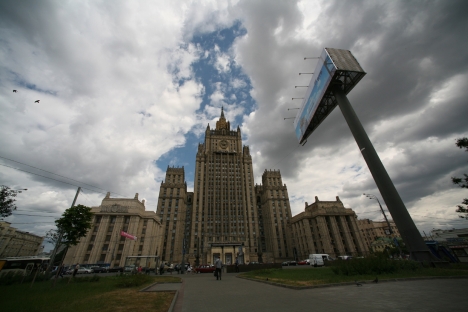
The Russian Ministry of Foreign Affairs. Source: PhotoXPress
Russia’s foreign policy in 2012 has seen both successes and setbacks. Moscow hosted the APEC summit, assumed the presidency of G-20 and started direct negotiations with neighboring Georgia, with which relations had broken off after the “hot August” of 2008. At the same time, Russia’s relations with the West soured over Syria and the human rights issue.
Russia’s new foreign policy concept
The Russian Ministry of Foreign Affairs has developed a new foreign policy strategy following a directive from Vladimir Putin, who was re-elected as president. In effect, it is Russia’s foreign policy platform for Putin’s third presidential term. It follows from the document that Russia will be relying on “soft power” and will position itself as an island of stability in an “increasingly unpredictable” world. Its main foreign policy priority is the post-Soviet space.
The APEC Summit help flex muscles
The 2012 APEC Summit in Vladivostok. Source: ITAR-TASS
The hosting of the APEC summit was Russia’s strongest bid for leadership within the Asia-Pacific region. A massive construction program boosted the summit’s capital, Vladivostok.
Visas still required for travel to the EU
Visa-free travel remans a thorny issue in Russia-EU relations. Source: ITAR-TASS
Talks on abolishing visas between Russia and the EU have been going on for several years, and, this year, visa requirements were expected to be canceled for certain groups of citizen.
However, no breakthrough occurred. Service passports held by Russian officials were the stumbling block. Russia was puzzled by the EU’s refusal to soften the visa rules. The Russian Foreign Ministry is convinced that the European Union’s behavior is groundless and that they are splitting hairs over trifles.
Relations sour with Germany
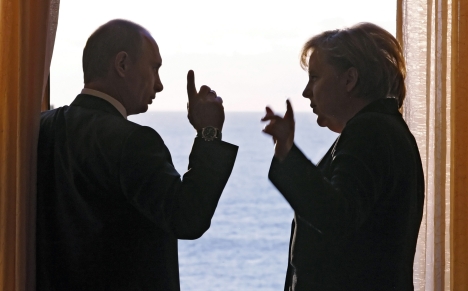
Russian President Vladimir Putin and German Chancellor Angela Merkel discussing the Russian-German relations. Source: AP
This year was also marred for Russia due to a dissension in relations with Germany, which has been Russia’s key EU ally.
The quarrel was triggered by a document containing 17 claims against Russia.
The document itself was issued by parliamentary deputy Andreas Schockenhoff, coordinator of Russian-German relations on the German side. German lawmakers passed a “recommendatory” resolution that called on German Chancellor Angela Merkel to be tough on Russia about human rights. Merkel raised the issues during her meeting with President Putin in November, prompting speculation about the end of the “special relationship” between the two countries.
As of Dec. 1, Russia is for the first time chairing the club of the world’s biggest economies – the G-20. The group accounts for 90 percent of the global GDP, 80 percent of world trade and two-thirds of the planet’s population. For Russia, this is not only an opportunity to prove itself as a skillful host but also a real chance to influence international economic policy.
"Magnitsky Act” has startling results
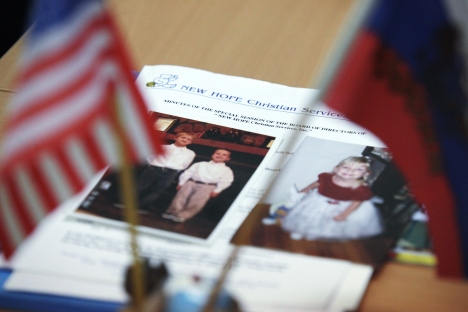
In response to the Magnitsky Act, Russian lawmakers supported the Dima Yakovlev bill that bans adoption of Russian children by American families. Source: RIA Novosti / Igor Rustak
In early December, the U.S. Senate passed a bill imposing visa restrictions on Russians suspected of complicity in the death of lawyer Sergei Magnitsky. Russia saw this as interference in its internal affairs. State Duma deputies responded to the adoption of the “Magnitsky list” by passing a law banning the adoption of Russian children by Americans. Political scientists spoke about “a breath of the Cold War.”
Green light for NATO cargo transit via Ulyanovsk
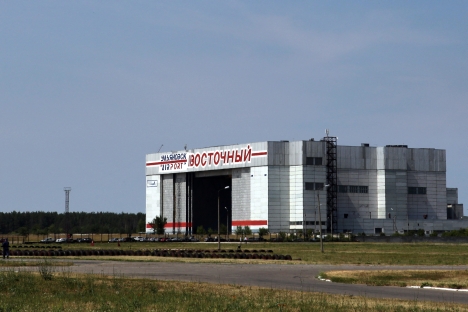
Ulyanovks will become cargo transit for NATO. Pictured: Vostochny airport in Ulyanovsk. Source: ITAR-TASS
In June, the Russian Government allowed air and land transit of cargo via Ulyanovsk, to and from Afghanistan. This is very important for NATO, which began withdrawing its forces from Afghanistan in 2012. The move was criticized by conservative sections of the Russian population. Many were afraid that a real “NATO base” had been established in the region. Vladimir Putin had to calm down local servicemen when visiting an army unit in August.
Syria fuels political tensions
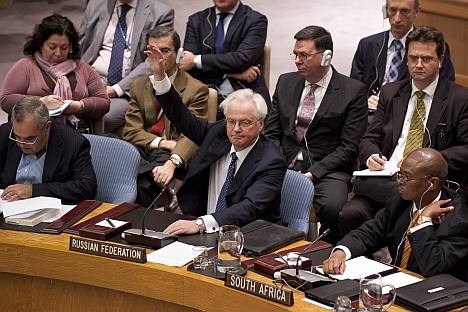
Russia's Permanent Representative to the UN Vitaliy Churkin condemned "efforts by some governments to justify their financial, material, technological or logistics support of illegal, armed groups active in Syria" as unacceptable. Source: Reuters
Against the background of powerful Western pressure on Syria, Russia was the main opponent to military interference in Syria’s civil war. Russian authorities think that the West’s support for the Syrian rebels will not lead to the country’s democratization; rather, they believe it will merely destabilize the region, give terrorists a free hand and undermine the primacy of international law in resolving political conflicts.
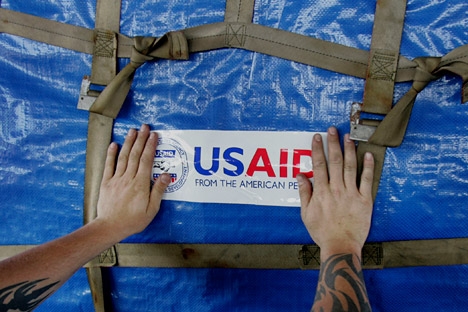
The USAID mission in Russia came to an end. Source: AP
Following tougher regulations concerning the financing of political and nongovernmental organizations on Russian territory, the U.S. Agency for International Development (USAID) left the country. Russian NGOs received about $100 million every year through the organization. The ejection of USAID was another stage in the growing tension between Russia and the United States.
Signs of rapprochement with Georgia
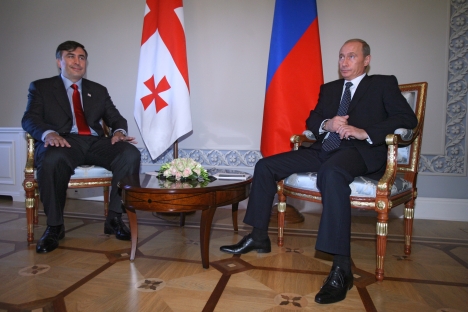
It remais to be seen whether Russia and Georgia will find common ground. Source: Kommersant
Towards the end of the year, Russia held the first direct talks in four years with its southern neighbor, Georgia. The diplomatic relations between the two countries were severed after the August 2008 military conflict. The start of negotiations was made possible by the victory of the opposition forces in the Georgian parliamentary elections and the serious weakening of President Mikhail Saakashvili’s positions.
All rights reserved by Rossiyskaya Gazeta.
Subscribe
to our newsletter!
Get the week's best stories straight to your inbox